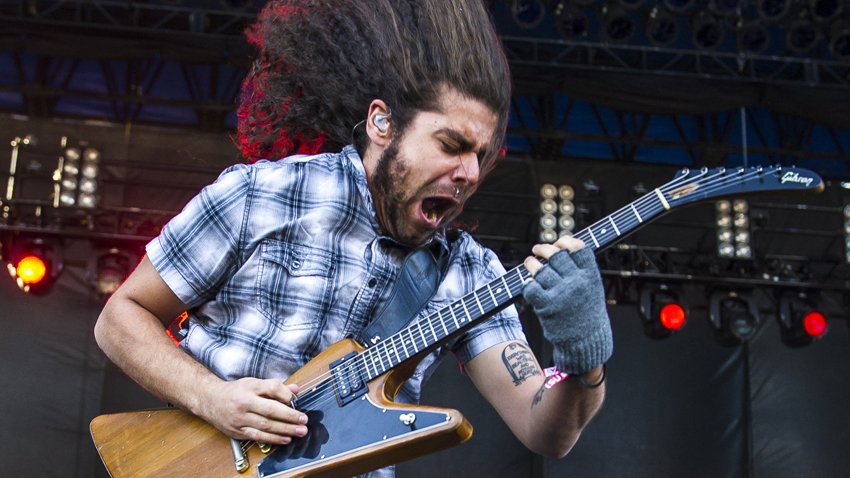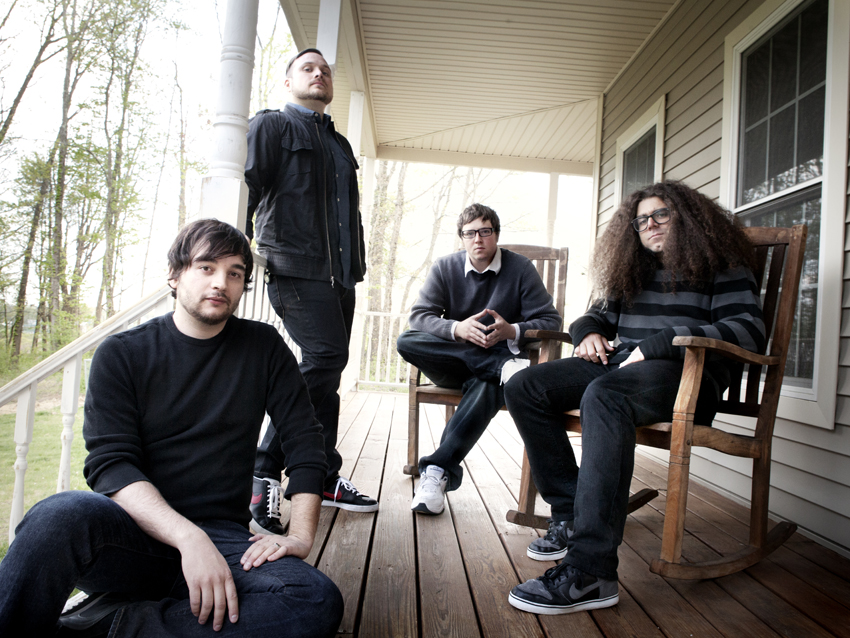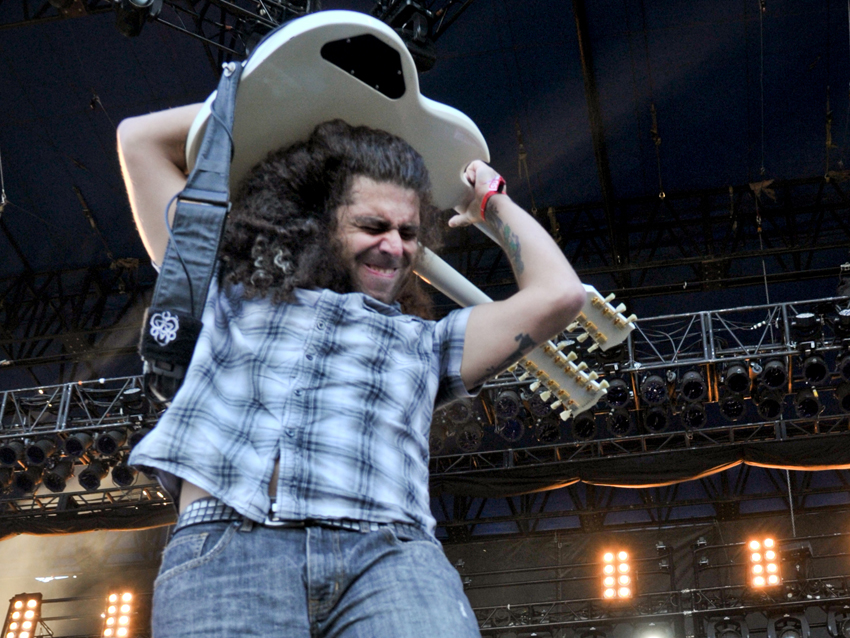
Coheed And Cambria singer and guitarist Claudio Sanchez has spent the whole of his musical career telling the tale of, well, Coheed and Cambria - the fictional characters he created for a good vs evil saga called The Armoy Wars. It's a storyline that has encompassed seven studio albums, a comic book series, a novel and will soon be turned into a feature-length film via Mark Wahlberg's company, Leverage Entertainment.
"It could be tough to give somebody a bullet-point version of the story," says Sanchez. "But the good thing is, you don't have to know a thing about the concept to just listen to our music and get into it. You don't even have to follow the story to like our records. That's always been a goal of mine."
Sanchez admits that he's started work on a new narrative that doesn't involves the protagonists Coheed and Cambria. "Basically, it's the story of Cyrus Amory and his discovery of the what the Keywork energy source is in relation to the colonies that all of these characters inhabit," he says. Before then, however, he and Coheed And Cambria - the band, that is (which includes guitarist Travis Stever, bassist Zach Cooper and drummer Josh Eppard) - have issued a new album, The Afterman: Descension, the companion to The Afterman: Ascension, which was released late last year. Both discs are musically diverse, full of rousing stadium rock, moody '80s pop and, as longtime fans would expect, bracing prog-metal.
Sanchez sat down with MusicRadar recently to talk about concept albums, the state of Coheed And Cambria, his process for riff writing and whether he's added any new guitars to the C&C sonic paradigm.
Partnering with Mark Wahlberg's company - that's got to be exciting.
"It is, sure. Leverage has done things like Entourage and Boardwalk Empire, so that's awesome. We're trying to figure out how to make the story into a full-length feature. I haven't had any conversations with Mark Wahlberg; my talks have been with David Gannon and Michael Garnett at Leverage. The Wahlberg thing came about right before we put it out there that it was going to happen."
Do you have a basic idea for what you want the film version to be, what you want it to look like?
Want all the hottest music and gear news, reviews, deals, features and more, direct to your inbox? Sign up here.
"I definitely have an idea of what I want. The comic books are certainly a visual extension of the record. We're trying to get a grasp of how we want the record to translate to film. I have ideas of how I want the band's music to be represented. I'm always thinking about how I want it to look like and how to present it to an illustrator. I guess that's not too different from presenting it to a director."
Why the decision to make two albums out of The Afterman? Did you ever consider making the whole thing one big release?
"We definitely did. For me, though, they made more sense separated. Being a comic book author, one of the things that I work with a lot are those cliffhangers that keep people coming back for more. That was my thought process, really, the idea that Ascension was the cliffhanger that led to the conclusion, which is what Descension is."

Coheed And Cambria, happy together, 2013. (from left) Zach Cooper, Travis Stever, Josh Eppard and Sanchez.
It's no secret that the band has had some turmoil over the past few years. How are things in the land of Coheed And Cambria now?
"I think things are settled. Ever since Good Apollo I, the From Fear Through The Eyes Of Madness record, we've had lineup changes due to chemical dependency issues. On this album, though, the lineup is as solid as it's ever been - and I mean going back to those early records.
"I'm glad that Josh has returned, and I think he's going about his sobriety in the right way. A lot of this material we had finished two years ago, but through the demoing process I thought that some of the songs weren't being punctuated the right way. I've always felt that Josh was just that - he's the right punctuator. He knows the way the songs should groove, and even when it comes to lyrics and building the themes, he knows how to put things across. He's the complete package when it comes to a drummer. He's got the chops, but he also takes into account the song, which a lot of drummers don't."
You missed having him in the band.
"Yeah, for sure. You know, we came up together; we built this thing together. Every once in a while, I'd think, How would Josh have played it? And if I were demoing, I'd sit down at the drum kit and emulate his playing. I can't play nearly as well as he does, but my approach always has him in mind.
"Being back in the band, he's really enthusiastic. When we started working on both Aftermans, it felt like we were picking right up where Good Apollo left off. I'm grateful that he's back in the band. I love his drumming."
What about having Zach in the group? He's working out OK?
"Absolutely. Zach is an amazing bass player, and he's got that same kind of enthusiasm - it's infectious. When you have somebody happy in the band - they want to work, they want to do their best - it really rubs off on everybody. So yeah, as a band, we're in the best place we've been in for a long, long time."
In 2011, your then bassist Michael Todd was arrested for armed robbery while on tour. Did you get a sense that he had some problems that would manifest themselves in such a way?
"We were surprised, for sure. We understood that he had some battles, but we had no idea that they were going to take him in that kind of direction. I don't think anybody knew that he'd take things so far."
The new album has some of your strongest riffs. Assuming you have one, what's your riff-writing process?
"Good riffs, to me, are spontaneous. If I find that I'm spending too much time on a riff and I'm just trying to pound it out, I'll end up throwing it away. A riff has to speak to me and present itself, and that's when I'll take advantage of it and turn it into a song. I don't want to overthink riffs. Every once in a while, I'll save riffs and bits of songs, but I don't usually return to them."
You've certainly made your share of concept albums. What are some concept albums that have really made an impression on you?
"I think The Wall was the biggest one. In '94, I finally got a chance to see Pink Floyd play on the Division Bell tour. That was my second concert, actually. I was just blown away by the visuals and the lights and everything. It opened my mind up tremendously, and then I went back and explored Floyd's catalogue.
"Going back to The Wall, the album and the film, I realized that this was something that I could do - or wanted to do. Amory Wars isn't really like The Wall; it's definitely more of a science fiction concept. But it stems from personal experiences and the things that I've been through. That's why I created it as science fiction, to impose it as something fake when, in truth, it's very real for me.
"I know it feels like a stock answer to say The Wall; it's not an obscure album. But in terms of the relationship between the album and the live show and the cinematic treatment, I don't think anything can top it."
Are there any classic concept albums that you never quite got? Anything that missed the mark for you?
"For me, it might have been 2112. When I first started getting into playing in a band, Rush were not one of my influences. It wasn't until the band started getting compared to Rush, that's when I began to listen to them, and I do like several of their albums.
"But the thing about 2112, the reason why I'm not really interested in it, it's about the way the lyrics were written, the way that they're so concept-heavy. I just couldn't find anything in them that I could relate to. It's very much a science fiction concept that is really presented to you in the lyrics, almost from a narrator. That, at first, is something I wasn't too into."

"I find that a lot of my solos emulate that bluesy pentatonic approach of David Gilmour," says Sanchez. © Amy Harris/Corbis
As you must know, Coheed And Cambria have been deemed a "prog band" - among other things, but that's the main descriptor that's stuck. Do you mind?
"No, I'm cool with that. I don't mind at all. To me, 'progressive' means something else than it does to other people. It means progress and that you're reaching; a band that's not limited to anything and doesn't have walls up around their art. Sure, Coheed have some seven and eight-minute epics that can be considered prog, but on this record we have some very concise tunes that could be pop. That is the progressive that I see - the evolution record to record, the growth, as opposed to an artist who writes the same record all the time.
"The term 'progressive' for us is a funny thing. Some Coheed fans don't even see us as a progressive band. I think that the lyrics and the messages in the songs are things that lots of people can get behind and understand, and maybe they can even see reflections of themselves in them. That's what separates us from the traditional meaning of 'progressive.'
"Our fan base is very widespread. Yes, it's a concept-driven piece, but it's something that's very personal. That's what transcends the whole progressive thing, ultimately. A lot of people become fixated on us being a progressive, concept-heavy band, but in actuality, we're really a wolf in sheep's clothing."
Guitar-wise, you've always been a big Gibson guy. Anything new you're playing these days?
"I'm still playing my traditional pieces - the Gibson E2 Explorers. On this tour, I've busted out a Fender Telecaster for the Afterman tune; I wanted more of a single-coil sound for that one. It's a fairly new model. I've always liked Telecasters and Strats - a Stratocaster was my first guitar, actually.
"One of my favorite guitar players of all time is David Gilmour, as well as Jimi Hendrix. I find that a lot of my solos emulate that bluesy pentatonic approach of David Gilmour, the kinds of things he put to the music of Pink Floyd. That's why I have those guitars, to sort of approximate that sound. Not that I could ever play like David Gilmour, but I try to get his vibe."
Joe is a freelance journalist who has, over the past few decades, interviewed hundreds of guitarists for Guitar World, Guitar Player, MusicRadar and Classic Rock. He is also a former editor of Guitar World, contributing writer for Guitar Aficionado and VP of A&R for Island Records. He’s an enthusiastic guitarist, but he’s nowhere near the likes of the people he interviews. Surprisingly, his skills are more suited to the drums. If you need a drummer for your Beatles tribute band, look him up.
